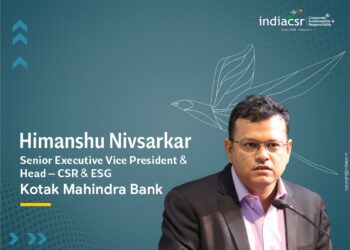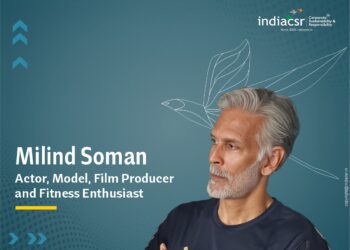By Rusen Kumar
MUMBAI: Pearl Tiwari heads Ambuja Cement Foundation, which manages Corporate Social Responsibility programs of Ambuja Cement. Under the leadership of Pearl 400 development professionals have been delivering excellence in social development with a pan-India presence active in 22 locations across 11 states. Having over 30 years of practicing experience, Pearl has been associated with the not-for-profit, educational and corporate sectors. She believes that Community development is closely linked to sustainability and hence a consistent focus on managing water resources, enhancing livelihoods and raising the bar in human development of communities.
Rusen Kumar, Editor of India CSR Network talked to her on recent development and future plans of Ambuja Cement Foundation for brining larger good for underserved of society. Excerpts of interview:
Ambuja Cement Foundation (ACF) has recently completed the 25th year of its operation, how has been the journey so far since the inception?
The journey of foundation began in the year 1993 with an objective of empowering communities and help them progress as the Company’s business progresses. With over two decades of focused work, it is striving to realise its vision to create a sustainable, prosperous society, built on long-term partnerships. Indeed, it feels great to play a role in the nation’s commitment to achieve Sustainable Development Goals.
What was the inspiration behind ACF formation? Please share key milestones achieved during this remarkable journey.
We have always believed in the power of the people and in this journey of 25 years, the people have proved to be the biggest growth drivers.
Some of the key milestones that I would like to mention:
Successful growth curve: Journey, which started with 10 villages in Kodinar (Gujarat) in 1993 has now spread to over 1000 villages in 22 locations across 11 states including Gujarat, Rajasthan, Himachal Pradesh, Maharashtra, Punjab and more. Today, we are impacting lives of more than 26 lakh people in livelihoods, health, education and natural resource management.
Bottom-up Approach: With this engaging approach and strategic initiatives, We make sure that the community’s needs and priorities are taken care of.
Increased people’s participation: Our mission have always been to energise, involve and enable communities to realise their potential. We, in all our projects, make sure to achieve community’s participation to the fullest.
Robust governance and compliance mechanism: In order to strengthen operations, foundation has invested in competent resources to strengthen the support functions – finance, HR and documentation and communications.
What are the future plans of activities for the next three years?
For the next few years, we will put more emphasis on equipping people in rural areas to earn a decent livelihood. This can be achieved by the means of strengthening people’s institutions, upgrading their existing skill set, providing better educational, infrastructural and health-related facilities, engagement in income generation activities and more.
Which are the key issues faced while implementing various initiatives and how did you overcome them?
Different projects and interventions have different challenges and can vary depending on the geography, people and their needs. For example, when working for the water program we deal with challenges such as depleting groundwater, equitable distribution of available water, building people’s capacity, etc.
We have tried to amalgamate the modern knowledge with traditional practices to provide better solutions in health, education and other segments in locations with an inadequate supply of basic facilities.
Which are the broad operational verticals for ACF? Please share with us details of the key projects/programmes initiated by the Foundation for overall Community Transformation.
Our programs are based on six thrust areas: Water Resource Management, Agricultural Livelihoods, Skill-based Livelihoods, Health, Women Empowerment and Education.
We have Ambuja Manovikas Kendra which is the only facility for special children in the entire district of Ropar, Punjab. At present, Kendra reaches out to nearly 90 children, all broadly fitting into the category of mentally challenged and provides them with a conducive environment tailored to meet individual development needs.
How challenging it is to bring together the strategic partners to meet the CSR agenda?
Social responsibility is something that companies have been doing for a long time. However, the CSR law has provided wider opportunities for corporates to collaborate and work together in order to achieve a larger mission.
There is still some amount of scepticism in relation to proper utilisation of funds, brand, etc. However, if companies decide to discuss the issues openly, this is not something that could not be worked out. What is important is that more collaborations would lead to better and faster outcomes.
Disclaimer: The views expressed by the interviewee in this feature are entirely her own and does not necessarily reflect the views of India CSR Network and its Editor.
Terms & Conditions: India CSR Network does not permit other Websites/Agency to copy or reproduce or reprint the above article/feature in any form or means.
Read More Exclusive Interview on CSR






















